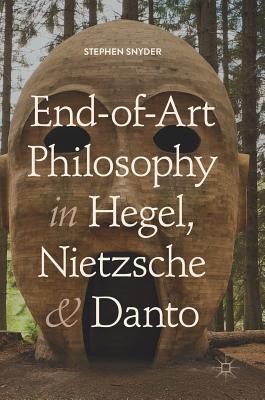
- We will send in 10–14 business days.
- Author: Stephen Snyder
- Publisher: Palgrave Macmillan
- ISBN-10: 3319940716
- ISBN-13: 9783319940717
- Format: 14.8 x 21 x 1.9 cm, kieti viršeliai
- Language: English
- SAVE -10% with code: EXTRA
End-Of-Art Philosophy in Hegel, Nietzsche and Danto (e-book) (used book) | bookbook.eu
Reviews
Description
This book examines the little understood end-of-art theses of Hegel, Nietzsche, and Danto. The end-of-art claim is often associated with the end of a certain standard of taste or skill. However, at a deeper level, it relates to a transformation in how we philosophically understand our relation to the 'world'. Hegel, Nietzsche, and Danto each strive philosophically to overcome Cartesian dualism, redrawing the traditional lines between mind and matter. Hegel sees the overcoming of the material in the ideal, Nietzsche levels the two worlds into one, and Danto divides the world into representing and non-representing material. These attempts to overcome dualism necessitate notions of the self that differ significantly from traditional accounts; the redrawn boundaries show that art and philosophy grasp essential but different aspects of human existence. Neither perspective, however, fully grasps the duality. The appearance of art's end occurs when one aspect is given priority: for Hegel and Danto, it is the essentialist lens of philosophy, and, in Nietzsche's case, the transformative power of artistic creativity. Thus, the book makes the case that the end-of-art claim is avoided if a theory of art links the internal practice of artistic creation to all of art's historical forms.
EXTRA 10 % discount with code: EXTRA
The promotion ends in 22d.08:32:51
The discount code is valid when purchasing from 10 €. Discounts do not stack.
- Author: Stephen Snyder
- Publisher: Palgrave Macmillan
- ISBN-10: 3319940716
- ISBN-13: 9783319940717
- Format: 14.8 x 21 x 1.9 cm, kieti viršeliai
- Language: English English
This book examines the little understood end-of-art theses of Hegel, Nietzsche, and Danto. The end-of-art claim is often associated with the end of a certain standard of taste or skill. However, at a deeper level, it relates to a transformation in how we philosophically understand our relation to the 'world'. Hegel, Nietzsche, and Danto each strive philosophically to overcome Cartesian dualism, redrawing the traditional lines between mind and matter. Hegel sees the overcoming of the material in the ideal, Nietzsche levels the two worlds into one, and Danto divides the world into representing and non-representing material. These attempts to overcome dualism necessitate notions of the self that differ significantly from traditional accounts; the redrawn boundaries show that art and philosophy grasp essential but different aspects of human existence. Neither perspective, however, fully grasps the duality. The appearance of art's end occurs when one aspect is given priority: for Hegel and Danto, it is the essentialist lens of philosophy, and, in Nietzsche's case, the transformative power of artistic creativity. Thus, the book makes the case that the end-of-art claim is avoided if a theory of art links the internal practice of artistic creation to all of art's historical forms.


Reviews